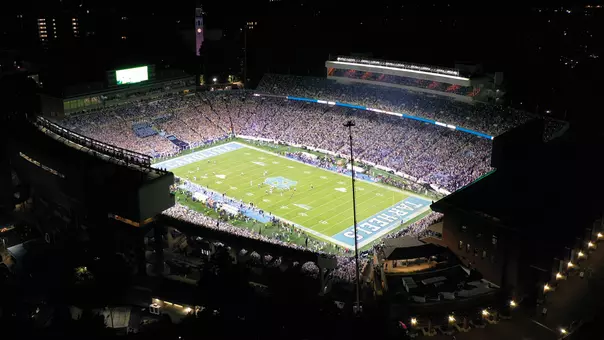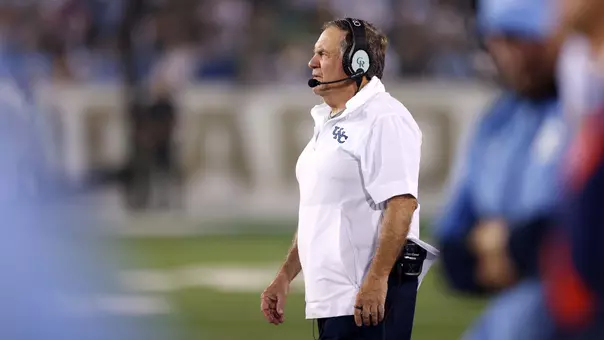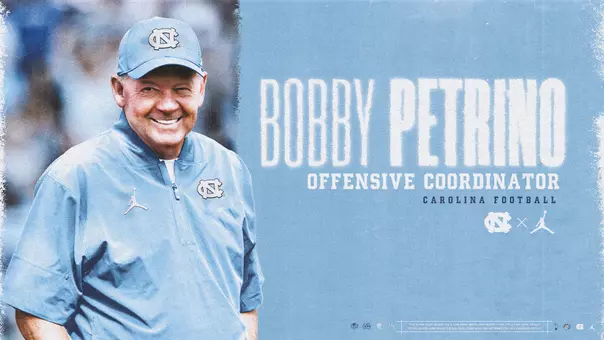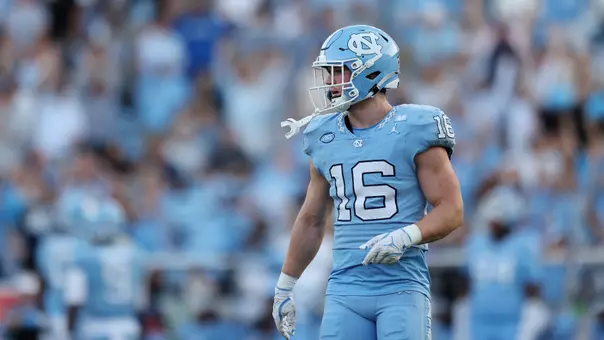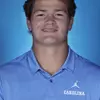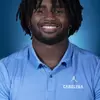University of North Carolina Athletics
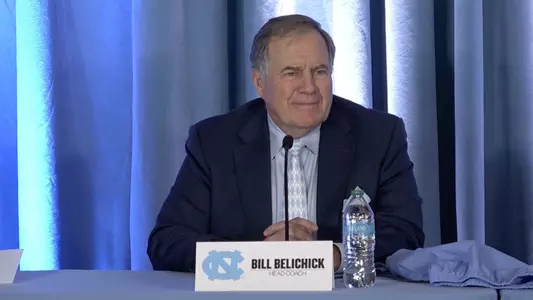
Extra Points: College Material
December 13, 2024 | Football, Featured Writers, Lee Pace, Extra Points
Imagine those Woollen Gym basketball practices in 1954-55 when Coach Frank McGuire and sophomore forward Lennie Rosenbluth were building a team that would become the 1957 national championship squad. Often an assistant football coach named Steve Belichick would drop by and bring his toddler son.
"McGuire had taken a special liking to the Belichick family and especially to its three-year-old son," David Halberstam wrote in The Education of a Coach. "Basketball practice always stopped when Steve and Bill showed up, and someone was ordered to find a basketball, always brand-new, to roll out to Bill."
George Barclay had a difficult task of following as head coach the future College Football Hall of Famer Carl Snavely, the architect of those vaunted post-war Charlie Justice-led juggernauts. He lasted three seasons from 1953-55 and Belichick was his secondary coach. The Belichicks lived in a house on Hillcrest Avenue in Carrboro.
"The Belichick family loved Chapel Hill, and Steve always regretted that Carolina was not a perennial football power," Halberstam wrote.
"As I grew up, I heard the same story over and over and over again," says Bill, now 72 years old. "One thing I always heard was, 'Billy's first words were beat Duke.'"
When Barclay was fired after winning just 11 games in three years, Belichick lost his job and moved his family to Annapolis, Md., where Steve coached and scouted on the Navy staff for more than three decades. Steve developed a niche for his detailed and intricate scouting reports on future opponents, and Bill as a teenager often tagged along, marveling at how his dad could diagram an entire play with just one viewing. Bill hung out around the Midshipmen players and reflected upon his father's death in 2005 how important the early influence of Navy greats like Roger Staubach and Joe Bellino had on him.
"Football was my life as a kid from when I first remember, four, five, six years old through the rest of my life," Belichick says. "My dad had a huge impact on my childhood, my love for the game and my involvement in the game as a coach."
Belichick elaborated more on his embryonic days in football Thursday afternoon when he was introduced as Carolina's new head football coach.
"I've always wanted to coach in college football. It just never really worked out. Had some good years in the NFL" … pause for understatement, given those six Super Bowl titles with the New England Patriots … "so that was okay. This is really kind of a dream come true. I grew up in college football with my dad coaching at Navy. It's great to come back home to Carolina and be back in an environment that I really grew up in."
Belichick's coaching career was launched half a century ago with a $25 a week job as an assistant on Ted Marchibroda's staff with the Baltimore Colts, and over stops in Detroit, Denver, New York, Cleveland and his legendary run in Foxborough, he always kept his eyes on Carolina and Chapel Hill when scouring the land for college players with pro potential. Having a rookie named Lawrence Taylor on his defense with the New York Giants beginning in 1981 gave Belichick proof they could turn out monster players at Carolina.
"As head coach, you can pick where you want to visit and send your assistants to the other places," he says. "I would take the trips to Carolina."
Belichick was head coach in Cleveland in the spring of 1992 when he and Browns player personnel director Michael Lombardi visited Chapel Hill and used the Carolina Inn as a home base as they evaluated players at area colleges.
"We set up a little office, watched tape, went for a jog, watched a baseball game," says Lombardi, who has joined Belichick as the Tar Heels' general manager. "We looked at each other on this campus and said, 'Why can't they win big here?' I know Mack Brown won a lot of games. But we're talking the playoffs, top 10. That's what sparked this whole thing."
Belichick reflects on his year away from coaching, about visiting son Stephen at the University of Washington, where Stephen is defensive coordinator, about fielding numerous phone calls from college coaches seeking his opinion on how to manage new rules in the college game that are long fixtures in the NFL, things like helmet communication and the two-minute timeout. He also found it interesting to watch as the college game with its NIL and transfer portal elements has morphed into more of a professional operation.
But college coaching? Bill Belichick? God forbid the Grumpy Lobster Boat Captain ever sitting for a mayonnaise bath after winning a bowl game. Instead of grousing after a Sunday press conference that it's "on to Cincinnati," he swats back a Jones Angell question with, "I'm not talking about that, we're on to Syracuse."
But it turns out the son of two teachers—his mother taught French and Spanish and his father began his career as a high school P.E. teacher and coach—could be more constitutionally suited for college life in the first place. All of these elements spliced and diced lend perspective on how and why the two-way courtship of Belichick and Carolina's administration made sense and eventually evolved into a job offer.
"I am grateful and appreciative," Belichick says. "I'm excited to be here, excited to be in college football, excited for the opportunity to build and develop young student-athletes and young men and prepare them for their life in the NFL or professionally."

So now the Tar Heels have a man leading their football program considered on the same level at his game that Dean Smith was anointed on the hardwood. Belichick is roundly considered in the coaching world as the brightest football mind of his generation, a brilliant teacher who sees the game on a different plane than anyone else. You play checkers. He plays chess.
"We've been playing football at Carolina since 1888, and I suspect in our 136 years there are few days that have been as auspicious as this one," Chancellor Lee Roberts says. "I have said many times we want to be the best public university in the United States, and that means excellence in everything that we do. We're going to have an excellent college football program; we want to compete with the best and we've hired the best coach."
As word began spreading earlier in the week that a deal to bring Belichick to Carolina was imminent, the sports world lit up like a firecracker. The gals on the Today Show yucked it up. Tar Heel football has been high on the front online page of the Wall Street Journal two days running. Garden & Gun mused whether Belichick would favor smoked pork from Lexington or Goldsboro?
Steve Logan spent time with the Patriots in the early 2000s between leaving East Carolina as head coach and launching a pro career that included stints with the NFL Europe and later Tampa Bay and San Francisco.
"You have a perception of Belichick because of those press conferences, but that's not what's really going on," says Logan, who's retired from coaching but does a regular podcast. "He's smart and he's funny, but he doesn't goof around. It's just business, you get your job done. I would work for him in a minute, in one minute. It was organized, thoughtful, highly intelligent, everything about it was attractive to me."
Ronnie McGill was a Tar Heel running back from 2003-06 and in 2010 entered the scouting and personnel business of the NFL, spending more than a decade working for Belichick and the Patriots.
"Bill is the best coach I have ever been around," says McGill. "The man is a genius. I was around to see it firsthand. I would not have wanted to spend most of my career under any other coach. I learned more about attention to the small things and attention to detail than most others.
"Standards and expectations are high. It makes a lot of folks break, but it also creates Tom Brady, Jon Jones, Matt Slater, Julian Edelman, Jerod Mayo. He brought out the absolute best of me because the expectations were that your best is all that is allowed, regardless of what is going on outside the building. Looking back, I hear people in the business talking about 'grinding.' Nobody really understands a grind like a Belichick grind."
Belichick was an offensive lineman in college at Wesleyan University in Middletown, Conn., and also played lacrosse while earning a degree in economics. He has continued his connection to lacrosse his entire life, and, over the years, developed a close friendship with Dave Pietramala, for two decades the head coach at lacrosse powerhouse Johns Hopkins University. Pietramala joined Joe Breschi's staff as Carolina's defensive coordinator in 2023, and Breschi was amused and impressed in conversation with Belichick in the summer of 2024 at Pietramala's wedding.
"He told me how much he loved Carolina and had lived here as a kid," Breschi says. "He was very interested in learning more about Carolina as a whole, the university, academics, athletics, the support systems. He was so engaging and seemed like a huge Tar Heel fan. He spoke to our team later and for 90 minutes was awesome, engaging and passionate. He understands the game, and that connected with our guys. He's all about leadership, teamwork, accountability and winning. I am so psyched he's here."
Of course, this only works if Belichick presses the right buttons with the only constituency that really matters—the players. He met with the Tar Heels Thursday as they wrap up exams and continue preparations for the Fenway Bowl after Christmas (Belichick said that interim head coach Freddie Kitchens will be retained on his staff). One of them, defensive end Kaimon Rucker, watched with mixed emotions as his career has ended and he'll sit out the bowl game with an injury sustained in the season finale.
"Coach Belichick is a man of few words, but his actions speak very loudly," Rucker says. "There was a lot of uncertainly the last week. But that's settled now. He's the man for the job, the man who can lead Carolina football in the direction we've been wanting to go for quite a while."
Belichick gave the Tar Heels their priorities: team first, teammates second, the individual third. He outlined the work ethic and suggested if they didn't truly love football, Chapel Hill might not be the place for them. He told them that dependability is more important than ability. He told them everyone has an opportunity, that their recruiting "stars" or accolades don't compute with performance on the field, this a man who in his 2018 Super Bowl appearance fielded a team with 18 undrafted free agents on a roster of 53. Diamonds in the rough are his stock in trade.
"I sensed total buy-in," Rucker said. "He can lead them to the promised land. It will be a great experience. I'm excited to see what happens."
At his introductory press conference, Belichick brought out a 70-year-old sweatshirt with UNC across the front that his dad had worn. He thanked reporters for their questions. He was self-effacing at times—"I tend to ramble on," he joked during a longish answer.

And he was quick with answers to two of the most salient questions:
What would you say to those worried you might head back to the NFL after a year or two?
"I didn't come here to leave," he said.
And why jump headlong into a coaching meat-grinder that sent your pal Nick Saban to retirement and the Game Day set a year ago?
"It beats working," he said. "When you love what you do, my dad taught me this, it's not work. I love what I do, I love coaching, the interaction with our players. I love building a team, working with the assistants, game planning, the game itself."
As Lee Roberts says, Carolina football has never hit a mark quite like this. Already Franklin Street purveyors have seen a jolt in merchandise sales. Season tickets will be gobbled up. And there are certainly the skeptics—will this work, can this work? We are going to find out.
ESPN senior writer Seth Wickersham gets the final word, telling of watching Belichick in April 2006 deliver the annual Fusco Distinguished Lecture at Southern Connecticut State University, on a stage that had also featured Colin Powell, Madeleine Albright and Christopher Reeve, among others.
"Like many, I worried that it would be a two-hour version of his news conferences," Wickersham says. "But he was in his element, relaxed and energized, speaking to students as they prepared to enter the real world. He told them to chase not money, but a job that was a continuation of a passion. One of the proudest moments of his life was when he passed on a career in finance and moved to Baltimore to do whatever the Colts asked of him."
Now Tar Heel Nation has a yearning request after eons of watching Jim Tatum die of a tick bite, the highs of Lawrence Taylor, Dre Bly and Drake Maye and the lows of Furman and James Madison running you out of your own house—consistent excellence in the game of football.
Chapel Hill-based writer Lee Pace has covered eight coaching eras over 50 years and writes "Extra Points" throughout the year on Goheels.com. He's been the sideline reporter for the Tar Heel Sports Network since 2004.
"McGuire had taken a special liking to the Belichick family and especially to its three-year-old son," David Halberstam wrote in The Education of a Coach. "Basketball practice always stopped when Steve and Bill showed up, and someone was ordered to find a basketball, always brand-new, to roll out to Bill."
George Barclay had a difficult task of following as head coach the future College Football Hall of Famer Carl Snavely, the architect of those vaunted post-war Charlie Justice-led juggernauts. He lasted three seasons from 1953-55 and Belichick was his secondary coach. The Belichicks lived in a house on Hillcrest Avenue in Carrboro.
"The Belichick family loved Chapel Hill, and Steve always regretted that Carolina was not a perennial football power," Halberstam wrote.
"As I grew up, I heard the same story over and over and over again," says Bill, now 72 years old. "One thing I always heard was, 'Billy's first words were beat Duke.'"
When Barclay was fired after winning just 11 games in three years, Belichick lost his job and moved his family to Annapolis, Md., where Steve coached and scouted on the Navy staff for more than three decades. Steve developed a niche for his detailed and intricate scouting reports on future opponents, and Bill as a teenager often tagged along, marveling at how his dad could diagram an entire play with just one viewing. Bill hung out around the Midshipmen players and reflected upon his father's death in 2005 how important the early influence of Navy greats like Roger Staubach and Joe Bellino had on him.
"Football was my life as a kid from when I first remember, four, five, six years old through the rest of my life," Belichick says. "My dad had a huge impact on my childhood, my love for the game and my involvement in the game as a coach."
Belichick elaborated more on his embryonic days in football Thursday afternoon when he was introduced as Carolina's new head football coach.
"I've always wanted to coach in college football. It just never really worked out. Had some good years in the NFL" … pause for understatement, given those six Super Bowl titles with the New England Patriots … "so that was okay. This is really kind of a dream come true. I grew up in college football with my dad coaching at Navy. It's great to come back home to Carolina and be back in an environment that I really grew up in."
Belichick's coaching career was launched half a century ago with a $25 a week job as an assistant on Ted Marchibroda's staff with the Baltimore Colts, and over stops in Detroit, Denver, New York, Cleveland and his legendary run in Foxborough, he always kept his eyes on Carolina and Chapel Hill when scouring the land for college players with pro potential. Having a rookie named Lawrence Taylor on his defense with the New York Giants beginning in 1981 gave Belichick proof they could turn out monster players at Carolina.
"As head coach, you can pick where you want to visit and send your assistants to the other places," he says. "I would take the trips to Carolina."
Belichick was head coach in Cleveland in the spring of 1992 when he and Browns player personnel director Michael Lombardi visited Chapel Hill and used the Carolina Inn as a home base as they evaluated players at area colleges.
"We set up a little office, watched tape, went for a jog, watched a baseball game," says Lombardi, who has joined Belichick as the Tar Heels' general manager. "We looked at each other on this campus and said, 'Why can't they win big here?' I know Mack Brown won a lot of games. But we're talking the playoffs, top 10. That's what sparked this whole thing."
Belichick reflects on his year away from coaching, about visiting son Stephen at the University of Washington, where Stephen is defensive coordinator, about fielding numerous phone calls from college coaches seeking his opinion on how to manage new rules in the college game that are long fixtures in the NFL, things like helmet communication and the two-minute timeout. He also found it interesting to watch as the college game with its NIL and transfer portal elements has morphed into more of a professional operation.
But college coaching? Bill Belichick? God forbid the Grumpy Lobster Boat Captain ever sitting for a mayonnaise bath after winning a bowl game. Instead of grousing after a Sunday press conference that it's "on to Cincinnati," he swats back a Jones Angell question with, "I'm not talking about that, we're on to Syracuse."
But it turns out the son of two teachers—his mother taught French and Spanish and his father began his career as a high school P.E. teacher and coach—could be more constitutionally suited for college life in the first place. All of these elements spliced and diced lend perspective on how and why the two-way courtship of Belichick and Carolina's administration made sense and eventually evolved into a job offer.
"I am grateful and appreciative," Belichick says. "I'm excited to be here, excited to be in college football, excited for the opportunity to build and develop young student-athletes and young men and prepare them for their life in the NFL or professionally."

So now the Tar Heels have a man leading their football program considered on the same level at his game that Dean Smith was anointed on the hardwood. Belichick is roundly considered in the coaching world as the brightest football mind of his generation, a brilliant teacher who sees the game on a different plane than anyone else. You play checkers. He plays chess.
"We've been playing football at Carolina since 1888, and I suspect in our 136 years there are few days that have been as auspicious as this one," Chancellor Lee Roberts says. "I have said many times we want to be the best public university in the United States, and that means excellence in everything that we do. We're going to have an excellent college football program; we want to compete with the best and we've hired the best coach."
As word began spreading earlier in the week that a deal to bring Belichick to Carolina was imminent, the sports world lit up like a firecracker. The gals on the Today Show yucked it up. Tar Heel football has been high on the front online page of the Wall Street Journal two days running. Garden & Gun mused whether Belichick would favor smoked pork from Lexington or Goldsboro?
Steve Logan spent time with the Patriots in the early 2000s between leaving East Carolina as head coach and launching a pro career that included stints with the NFL Europe and later Tampa Bay and San Francisco.
"You have a perception of Belichick because of those press conferences, but that's not what's really going on," says Logan, who's retired from coaching but does a regular podcast. "He's smart and he's funny, but he doesn't goof around. It's just business, you get your job done. I would work for him in a minute, in one minute. It was organized, thoughtful, highly intelligent, everything about it was attractive to me."
Ronnie McGill was a Tar Heel running back from 2003-06 and in 2010 entered the scouting and personnel business of the NFL, spending more than a decade working for Belichick and the Patriots.
"Bill is the best coach I have ever been around," says McGill. "The man is a genius. I was around to see it firsthand. I would not have wanted to spend most of my career under any other coach. I learned more about attention to the small things and attention to detail than most others.
"Standards and expectations are high. It makes a lot of folks break, but it also creates Tom Brady, Jon Jones, Matt Slater, Julian Edelman, Jerod Mayo. He brought out the absolute best of me because the expectations were that your best is all that is allowed, regardless of what is going on outside the building. Looking back, I hear people in the business talking about 'grinding.' Nobody really understands a grind like a Belichick grind."
Belichick was an offensive lineman in college at Wesleyan University in Middletown, Conn., and also played lacrosse while earning a degree in economics. He has continued his connection to lacrosse his entire life, and, over the years, developed a close friendship with Dave Pietramala, for two decades the head coach at lacrosse powerhouse Johns Hopkins University. Pietramala joined Joe Breschi's staff as Carolina's defensive coordinator in 2023, and Breschi was amused and impressed in conversation with Belichick in the summer of 2024 at Pietramala's wedding.
"He told me how much he loved Carolina and had lived here as a kid," Breschi says. "He was very interested in learning more about Carolina as a whole, the university, academics, athletics, the support systems. He was so engaging and seemed like a huge Tar Heel fan. He spoke to our team later and for 90 minutes was awesome, engaging and passionate. He understands the game, and that connected with our guys. He's all about leadership, teamwork, accountability and winning. I am so psyched he's here."
Of course, this only works if Belichick presses the right buttons with the only constituency that really matters—the players. He met with the Tar Heels Thursday as they wrap up exams and continue preparations for the Fenway Bowl after Christmas (Belichick said that interim head coach Freddie Kitchens will be retained on his staff). One of them, defensive end Kaimon Rucker, watched with mixed emotions as his career has ended and he'll sit out the bowl game with an injury sustained in the season finale.
"Coach Belichick is a man of few words, but his actions speak very loudly," Rucker says. "There was a lot of uncertainly the last week. But that's settled now. He's the man for the job, the man who can lead Carolina football in the direction we've been wanting to go for quite a while."
Belichick gave the Tar Heels their priorities: team first, teammates second, the individual third. He outlined the work ethic and suggested if they didn't truly love football, Chapel Hill might not be the place for them. He told them that dependability is more important than ability. He told them everyone has an opportunity, that their recruiting "stars" or accolades don't compute with performance on the field, this a man who in his 2018 Super Bowl appearance fielded a team with 18 undrafted free agents on a roster of 53. Diamonds in the rough are his stock in trade.
"I sensed total buy-in," Rucker said. "He can lead them to the promised land. It will be a great experience. I'm excited to see what happens."
At his introductory press conference, Belichick brought out a 70-year-old sweatshirt with UNC across the front that his dad had worn. He thanked reporters for their questions. He was self-effacing at times—"I tend to ramble on," he joked during a longish answer.

And he was quick with answers to two of the most salient questions:
What would you say to those worried you might head back to the NFL after a year or two?
"I didn't come here to leave," he said.
And why jump headlong into a coaching meat-grinder that sent your pal Nick Saban to retirement and the Game Day set a year ago?
"It beats working," he said. "When you love what you do, my dad taught me this, it's not work. I love what I do, I love coaching, the interaction with our players. I love building a team, working with the assistants, game planning, the game itself."
As Lee Roberts says, Carolina football has never hit a mark quite like this. Already Franklin Street purveyors have seen a jolt in merchandise sales. Season tickets will be gobbled up. And there are certainly the skeptics—will this work, can this work? We are going to find out.
ESPN senior writer Seth Wickersham gets the final word, telling of watching Belichick in April 2006 deliver the annual Fusco Distinguished Lecture at Southern Connecticut State University, on a stage that had also featured Colin Powell, Madeleine Albright and Christopher Reeve, among others.
"Like many, I worried that it would be a two-hour version of his news conferences," Wickersham says. "But he was in his element, relaxed and energized, speaking to students as they prepared to enter the real world. He told them to chase not money, but a job that was a continuation of a passion. One of the proudest moments of his life was when he passed on a career in finance and moved to Baltimore to do whatever the Colts asked of him."
Now Tar Heel Nation has a yearning request after eons of watching Jim Tatum die of a tick bite, the highs of Lawrence Taylor, Dre Bly and Drake Maye and the lows of Furman and James Madison running you out of your own house—consistent excellence in the game of football.
Chapel Hill-based writer Lee Pace has covered eight coaching eras over 50 years and writes "Extra Points" throughout the year on Goheels.com. He's been the sideline reporter for the Tar Heel Sports Network since 2004.
Players Mentioned
UNC Men's Basketball: Tar Heels Battle Back to Top #14 Virginia, 85-80
Saturday, January 24
Carolina Insider - Interview with Reese Brantmeier (Full Segment) - January 23, 2026
Saturday, January 24
UNC Gymnastics: Tar Heels Down Pitt in Carmichael
Saturday, January 24
UNC Women's Basketball: Tar Heels Outlast Georgia Tech, 54-46
Friday, January 23











